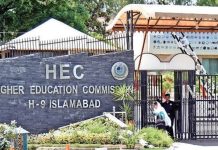By Ali Imran
ISLAMABAD: Federal Minister for Planning and Development Professor Ahsan Iqbal on Sunday announced that the government was committed to providing the youth with advanced education, digital training and equal employment opportunities to prepare them for future challenges.
He emphasized that nations with fewer resources have surpassed Pakistan because of their political stability and continuity of policies.
In contrast, Pakistan has suffered from internal discord and extremism due to political instability and lack of policy continuity.
The minister highlighted that visionary long-term plans like Vision 2010 and Vision 2025 were never fully implemented. Addressing a ceremony at University of Narowal where laptops were distributed to students under the Prime Minister’s Laptop Scheme, Professor Iqbal criticized the 2018 elections, labeling them as fraudulent and responsible for imposing an incompetent government on Pakistan. This government, he said wreaked havoc on the economy, causing immense suffering for the 240 million citizens. “The present government has realigned the country’s direction, bringing stability and improvement across various sectors”. Ahsan Iqbal said. Economic ties with Saudi Arabia, the United Arab Emirates (UAE), Kuwait, Qatar, and China are being restored, and the stock market is reaching new heights, reflecting the confidence of both domestic and international investors in the government’s policies.
Professor Iqbal highlighted the government’s vision to provide a digital platform to the youth, enabling them to propel Pakistan into the world’s top ten economies by its 100th anniversary.
He said record funds have been allocated for higher education, with plans to establish universities in every district and institutions for technical education. Laptops are being distributed on merit, with options for students to purchase on easy installments if they do not qualify on merit. The initiative aims to equip the youth with digital technology for employment, he said.
While addressing the issue of intolerance and unrest in Pakistan, a country founded in the name of Islam, he stressed that Islam signifies peace and brotherhood. The organization and harmony in the universe exemplify these principles. By adopting these principles of organization and mutual cooperation, society can achieve peace and progress, he added.
Ahsan Iqbal urged the students to prioritize research over merely obtaining degrees, expressing pride in the day their research articles are published in international journals.
He praised the University of Narowal as a model of social progress, women’s empowerment and economic development.
Between 2013 and 2018, several university campuses were established in various districts of Balochistan, he added.
He condemned the four-year government imposed through rigged elections for causing severe economic and social damage to Pakistan, using social media to spread propaganda and poison the minds of the youth.
This so-called ‘change government’ brought nothing but destruction, halting all ongoing projects, which have now doubled in cost, he said and added, the misinformation on social media has divided the public, but we must resist this turmoil. No country can progress without peace, stability, continuity of policies and a reform agenda, he expressed.
Under the leadership of Prime Minister Shehbaz Sharif, he said the government has swiftly corrected the country’s course, restoring investor confidence, and improving the stock market, he added.
As part of the Prime Minister’s Laptop Scheme, the minister distributed around 77 laptops to the University of Narowal students.
Vice Chancellor Professor Dr. Muhammad Younas Rana lauded the minister exemplary contributions to education and thanked him for providing excellent educational facilities to the students of the University of Narowal.
The event was attended by students, their parents, National Assembly member Chaudhry Anwar-ul-Haq, Provincial Assembly member Ahmad Iqbal Chaudhry, Pir Syed Azhar-ul-Hassan Gillani, and notable figures from the political, social, and academic spheres.






